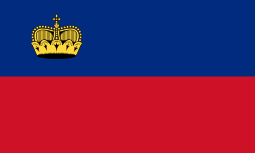The national flag of the Principality of Liechtenstein (German: Flagge Liechtensteins) consists of two horizontal bands, one blue and one red, charged with a gold crown in the canton. In use since 1764 and officially enshrined into the nation's constitution in 1921, it has been the flag of the principality since that year. The crown was added to the flag in 1937, after the country discovered at the Summer Olympics held the previous year that their flag was identical to the Haitian civil flag.
 | |
| Use | Civil and state flag |
|---|---|
| Proportion | 3:5[1] |
| Adopted | 30 June 1982 |
| Design | A horizontal bicolour of blue and red, charged with a gold crown in the canton |
History
editLiechtenstein was formed in 1719 as a principality within the Holy Roman Empire and gained complete independence in 1866.[2] Within this period, the colours blue and red were selected to feature on the flag, instead of the gold and red on the coat of arms that would have customarily been employed instead. These new livery colours were first utilized by Prince Joseph Wenzel I in 1764.[1]
A new constitution for the Principality was formulated and proclaimed in October 1921.[1][3] It made the blue and red banner the national flag by granting it "official status".[1] Fifteen years later, during the 1936 Summer Olympics, the country came to the realization that its flag was identical to the flag of Haiti (Haiti took part in the Opening Ceremony but its sole athlete did not compete). Because of this finding, the government added the prince's crown to the canton.[1][4][5] This change served two purposes – to signify Liechtenstein's position as a principality, and to distinguish its flag from Haiti's.[4][6] This modified design was adopted on 24 June 1937.[6]
Design
editConstruction
editSymbolism
editThe colours and symbols of the flag carry cultural, political, and regional meanings. The blue represents the sky, while red alludes to the "evening fires" that are lit inside houses throughout the country.[1] The crown is gold[4][5] or yellow[1] in colour.[6]
Color scheme
edit| Colour scheme |
Blue | Red | Yellow | Black |
|---|---|---|---|---|
| RAL | 5010 | 3020 | 1016 | 9005 |
| CMYK | 100-70-0-50 | 0-96-84-19 | 0-15-77-0 | 0-0-0-100 |
| HEX | #002780 | #CF0921 | #FFD93B | #000000 |
| RGB | 0-39-128 | 207-9-33 | 255-217-59 | 0-0-0 |
Other flags of Liechtenstein
editGovernment flags
edit| Flag | Duration | Use | Description |
|---|---|---|---|
| 1912–1957 | Standard of the Prince of Liechtenstein | ||
| 1957–1982 | Standard of the Prince of Liechtenstein | ||
| 1982–present | Standard of the Prince of Liechtenstein | ||
| 1982–present | Standard of the Government of Liechtenstein | ||
| Banner of the Princely House of Liechtenstein | |||
| Pennant | |||
| Vertical |
Municipal flags
editEach of the eleven municipalities has its own flag, all flown as vertical banners.
| Flag | Municipality | Adopted | Description | |
|---|---|---|---|---|
| Balzers | ||||
| Eschen | ||||
| Gamprin | ||||
| Mauren | ||||
| Planken | ||||
| Ruggell | ||||
| Schaan | ||||
| Schellenberg | ||||
| Triesen | ||||
| Triesenberg | ||||
| Vaduz | ||||
Historical flags
edit| Flag | Duration | Use | Description |
|---|---|---|---|
| 1437-1719 | Flag of the Lordship of Schellenberg | ||
| 1342-1719 | Flag of the County of Vaduz | ||
| 1719–1852 | Flag of the Principality of Liechtenstein | Two horizontal gold and red bands at 3:5 proportions | |
| 1852–1921 | Flag of the Principality of Liechtenstein | Two vertical blue and red bands at 3:5 proportions | |
| 1921–1937 | Flag of the Principality of Liechtenstein | Two horizontal blue and red bands at 3:5 proportions | |
| 1937–1982 | Flag of the Principality of Liechtenstein | Two horizontal blue and red bands at 3:5 proportions, and princely crown in the canton |
References
edit- ^ a b c d e f g Smith, Whitney (July 17, 2013). "Flag of Liechtenstein". Encyclopædia Britannica. Encyclopædia Britannica, Inc. Retrieved June 26, 2014. (subscription required)
- ^ "Liechtenstein profile". BBC News. BBC. Retrieved June 26, 2014.
- ^ "History of Liechtenstein". Lonely Planet. Retrieved June 26, 2014.
- ^ a b c "Liechtenstein". The World Factbook. CIA. Retrieved June 26, 2014.
- ^ a b Rainey, Venetia (July 24, 2012). "Flag bearing: a potted history". Reuters. Retrieved June 26, 2014.
- ^ a b c Kindersley, Dorling (November 3, 2008). Complete Flags of the World. Dorling Kindersley Ltd. p. 148. ISBN 9781405338615. Retrieved June 26, 2014.
External links
edit- Liechtenstein at Flags of the World
- Original Law text (in German)